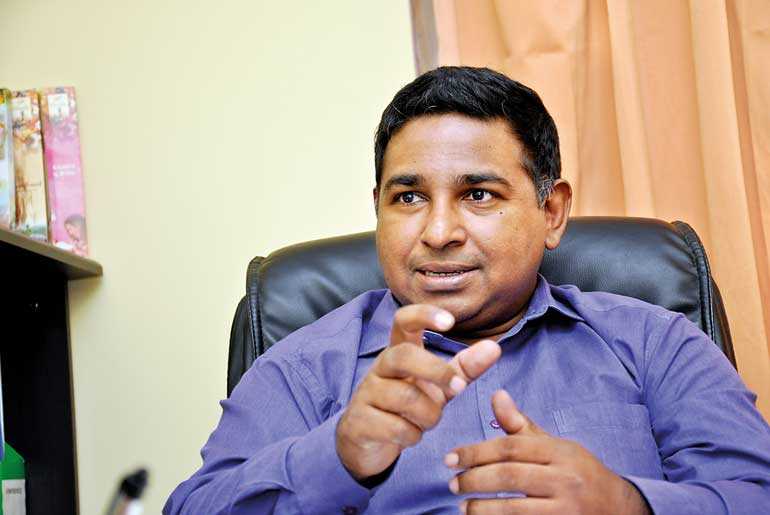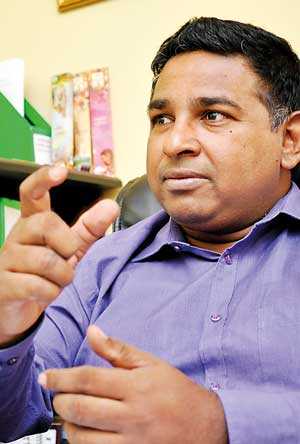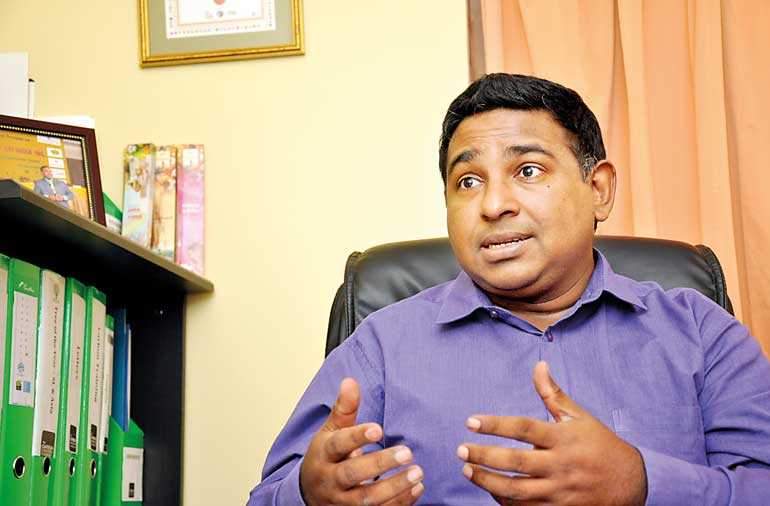Tuesday Feb 17, 2026
Tuesday Feb 17, 2026
Tuesday, 25 September 2018 00:00 - - {{hitsCtrl.values.hits}}

Carbon Consulting Company CEO Sanith De Silva Wijeyeratne
The Carbon Consulting Company (CCC) has been an avid change-maker in the region pushing the boundaries of what environmental sustainability can do to empower local businesses and communities. CCC’s tried-and-tested methods help clients measure, manage and mitigate their environmental impact and reach sustainability goals. Daily FT spoke with Carbon Consulting Company CEO Sanith De Silva Wijeyeratne to know more about what they do, the impact they have had on people, the challenges they face in advocating for sustainability, success stories of clients and future sustainability goals.
Following are excerpts:
By Ruwandi Gamage
Q: The Carbon Consulting Company offer services covering avenues such as carbon, water, waste, energy and biodiversity for corporate sustainability. Can you give me an introduction to how you provide your services?
A: We have different services that we provide depending on what kind of service a company, an organisation or an individual is looking for. We have developed a service model, 5Ms, which is Measure, Manage, Mitigate, Maximise and Market. Recently we have added another ‘M’, Materiality, a step that precedes all the above mentioned steps, which is used by sustainability assessors globally to identify the relative importance of specific environmental, social and governance issues that are of highest priority for a business.
Imagine if your environmental impact could be quantified from a scale of one to 100, and 70 of that is in plastic pollution, and the rest is water and energy. There is no point of focusing too much on the sustainability of the energy consumption of your company if its biggest pollution is plastic. So we will look at how ‘material’ the identified impacts are to the environment and then identify which environmental impacts are most material and significant to that company. Then we provide the services to help audit that through the process of 5Ms.
We don’t believe in short-term assessments, ours is a time consuming, stringent but productive process that encourages clients to commit to an extended period where they would continue to measure, monitor and reduce their environmental impacts over time without any external assistance.
We’re best known for carbon footprinting, but we have branched out into water, energy, waste, biodiversity and also helping companies formulate their sustainability strategies from the apex body of a company downwards. We firmly believe that unless companies build in sustainability at a corporate planning level, they will never really be able to go green. We want to be a real sustainability partner and not just another environmental auditor, and that’s essentially what we do.
Q: Do clients come to you or do you have a process of seeking clients out?
A: It’s a bit of both. Going back eight years when we first started this company, people didn’t know what a carbon footprint was. We spent our time calling people up and educating them on what climate change is, about the part their company plays in contributing to that impact and the role they have to play to solve the problem.
At the beginning it was us reaching out to companies. But since then we’ve been closely associated with the increase in awareness of environmental impacts in the corporate sector, and today we have people call us up for our help in assessing and reducing their carbon footprint, amongst other impacts.
Q: How do you identify the companies that need to embrace the concept of sustainability in their operational framework?
A: We tended to prioritise companies that were part of global supply chains, especially during the early years of our company, partly because we felt that they were the ones most likely to embrace these concepts because of the influence from their global networks. Apparel and IT are sectors that have very strong links to global players and so we had some initial success there. That’s how we started.
Today, I am really happy to say that we deal with a large cross-section of companies including some major banks, manufacturing and service firms that are working with us to evaluate their environmental impacts. And I am happy to say that all these companies have recognised the need to look beyond traditionally-identified business frameworks to understand the dire need to becoming sustainable. Many of them have been convinced by our holistic solutions and business-centric approach. However, we hope that we see a greater diversity in industries that embrace this concept in the years to come.
Q: So your client base is mostly big multi-million dollar companies?
A: Actually, that’s not accurate. Our client portfolio varies between companies with 10 to over 10,000 employees. We work with some of the leading banks in this country, including the two largest, and one of them has over 700 branches that we need to cover. We just got a project in Thailand with an organic rice company with just 10 employees. So, we have the entire spectrum – large global companies to small local companies.
It doesn’t really matter how big your company is. It’s about how focused you are as an industrialist or entrepreneur in helping to solve the problem, rather than being content thinking it’s someone else’s problem.
Q: Do you have plans to expand into the region?
A: Well, one of the things we had set out for last year and this year was to expand our presence. We see ourselves as a central hub for the South Asian region. We’ve set ourselves up as almost like a Knowledge Process Outsourcing model. We have a highly qualified team of consultants.
We’re a small company, we keep our costs low, but we’re able to offer our services both in the Middle East and in the South Asian region. Stretching from Singapore, Malaysia in the East to Abu Dhabi, Dubai, Bahrain and Oman in the West. Everything falls within about a four-hour flight. Maldives and India we’ve been in for a little while now, which were the first countries we entered. We’ve just been told that we’ve been given a green light in Malaysia, Oman, Singapore and Thailand. Our strategies have always been to really grow our capabilities here in Sri Lanka and prove that we’re really good at what we do.
Q: Given that many Sri Lankans are not very aware of their environmental impacts or how it affects them as well, what are the challenges you face in getting local industries on board with this?
A: One problem is our companies don’t see a business case for this, and just want profits. It’s not a question of ‘can we make money out of this?’ It’s a question of ‘can we earn profits while being socially and environmentally conscious?’ If CEOs and directors actually understood that every time they make profits, it’s at a cost to the environment, they will hopefully want to make an effort to reduce that impact. That’s what we’re trying to get them to do. Substantial environmental metrics still haven’t reached the boardrooms here, and the focus is always on getting everything done at a cheaper cost.
We also now have a couple of smaller competitors who have sprung up in the recent past, copying new ideas that we conceptualised and developed like our Conscious range certifications, specifically CarbonConscious. They are approaching companies and offering these services at a much lower cost. And these people aren’t worried about whether the data they’re getting for the assessments are accurate. We know from experience that you can’t get accurate data unless we go verify and validate it. So sometimes without all these processes they write you a blank certification.
These people don’t have any environmental integrity or any professional ethics – we know because we have had clients come our way as a result of bad experiences with them. If companies don’t genuinely believe that they need to be honest and truthful about what they are doing, and they view it as just another box that needs to be ticked-off on a compliance or award checklist, there are many people who will come and do that for them for a very low price. We refuse to operate at that level.
Another challenge is creating a culture that values independent assurance. We have some companies who do a lot of work internally, who are already doing a great job. But unfortunately, it is just a few. Many companies see sustainability as being limited to a year-end sustainability report. There seems to be no emphasis on having the sustainability activities and claims made by these companies independently verified or assured by a competent, independent expert. It’s always good to get an independent expert opinion so that you know you are in conformance to accepted standards and it’s not just something that you’re claiming, because it’s very easy to greenwash.
Q: How do you compare to other competitors in the region? Why do you think these international companies are reaching out to you?
A: Surprisingly, and in all humility, I can’t find another company like us in the South Asian region. There are companies who perhaps do just one or two aspects of what we do, but we haven’t found anybody who combines everything under one offering like we have – an integrated sustainability solution. There are of course global auditing companies who are predominantly financial auditors and have a spin-off into sustainability as well. On the other hand, India has a lot of freelancers who do carbon footprint calculations but they don’t do the advisory part of it. So everything is bits and pieces and nobody that I have found matches the depth of services we offer.
Our reputed international partnership also plays a vital part in our regional presence. For example, we are the Asian partner for Natural Capital Partners who were recently awarded the title of Best Offset Retailer for the eighth consecutive year and Best Advisory Service/Consultancy for a second straight year by the global magazine Environmental Finance. Such partnerships lend us a lot of global credibility as we consistently uphold the international standards and protocols in our work.
Also the technical part of what we do is only 50% of our work. We’re a success because we combine the marketing and communications parts together. We work with clients to integrate their sustainability activities into the business case to ensure that it delivers better value for them. So it becomes a partnership and not just a transactional relationship where every year the client looks at an allocated budget and says they will call for tenders. Our combination of sustainability services, the training and awareness that we provide and the marketing and communication support are some of the reasons for the success we’ve had.
Q: What is your opinion about what a corporate should do regarding sustainability before they consult a company like you and get certified?
A: The key is to make a decision about the need to be environmentally friendly at a senior level. The thinking has to come from the top of the chain because then everything else falls in line. So step number one is at a corporate level to take a concrete decision that you need to understand and analyse the impact that your company is having on the natural environment.
Step number two is you engage with somebody like us who will come and help you understand the different aspects of the business that creates an impact and quantify that. Once they take that step, then they can bring those decisions into their corporate strategy. We would like CEOs to accept that it’s everybody’s problem and to integrate sustainability performance metrics into both company and personal KPIs, rather than attributing sustainability to one department. Issues like global warming and climate change are everyone’s problems.

Q: What kind of regulatory reforms would you like to see as a country with regards to sustainability?
A: I don’t think regulation alone is the answer. If you pass a law that says every company over certain criteria has to have a certain carbon footprint, the day the gazette is passed, there’ll be a hundred companies popping up saying they can assess that. They will be very happy to take your money and offer a certificate, because all that the regulation requires is some independent person to give you a certification. Businesses won’t be interested in the environment, just being in compliance with the new regulation, which would defeat the entire purpose.
For example, India has passed a law that requires companies over a certain size to spend a minimum of 2% of their profit on CSR projects. And there are some regulations that say you can’t bring down foreign consultants, which benefits the economy of the country as well. I believe that kind of model might work here. When I say CSR I don’t mean supporting your local school’s sports team. It should be tangible projects that benefit the environment, evaluated, measured independently and reported – that makes sense. Imagine if today every company was going to take 2% of their profits and invest it in creating renewable energy or water related projects in this country – it would be fantastic. So, all is possible if we had a structure where it’s a mixture of regulation and independent verification.
Q: Tell me a key success story of one of your clients?
A: Well there’s not one but quite a few. Some of our clients have been the first in the world in their respective industries to establish sustainability. Eswaran Brothers was the world’s first CarbonNeutral Tea Company. The Hirdaramani Group’s Mihila Factory was Asia’s first CarbonNeutral Apparel Factory. Walkers Tours achieved Asia’s first CarbonNeutral Vehicle Fleet. The Hanwella Factory of MAS Holding’s Aqua Trading Global (formerly Linea Aqua) was the world’s first Apparel Factory to become WaterNeutral, which was another new certification we developed based on our own and other international studies. It took Aqua Trading Global five years to actually reach that level, but they were visionaries and were invested enough to want to achieve water neutrality.
We also had a small company hire us to reduce their carbon footprint. This resulted in annual savings of a guaranteed minimum of Rs. 6 million. There are case studies like that where we’ve been able to provide clients with significant operational savings. Over the span of eight years, we’ve helped save over 20 million litres of water and reduce over a 100 million kilos of greenhouse gases.
Q: Other than branching out into the region, what are the other future plans of the company?
A: One of our more ambitious goals is to play a bigger role in the region, working with clients in a more in-depth manner instead of just auditing. We also want to grow our relationship, where we are not just auditors but also sustainability partners or associates. We are privileged to have reached the 100 client landmark over the past eight years, two years before our initial target, and many clients have stayed with us for the past six years!
Another goal we have is to play a part in impacting the nation’s direction for sustainability. We believe that we have value to add because we have the technical skills, the vision and the drive to ensure that Sri Lanka moves forward in the right direction. We would like to play a bigger role moulding some of the nation’s priorities and objectives. We want to help formulate policy mechanisms that affect the country, because it’s only when we have these frameworks in place that sustainability can move forward.
We are encouraged by the fact that the President himself has taken the mantle of stewardship of the environment under his portfolio and is providing great leadership to the country in this regard. One of my board members, Prof. Mohan Munasinghe is the Senior Advisor to the President on sustainability, and he’s been an advisor to other international governments as well. He’s a Nobel Laureate and an internationally acclaimed speaker on Climate Change, speaking alongside international icons such as former US President Barack Obama. Which is why I said that we take the integrity of our work very seriously.
Right now, we’re working with the private sector, because we believe that if the companies don’t change, nothing is going to happen, as they’re the ones that are creating most of the environmental impact themselves. However, there is a role that the Government also has to play, and it’s not just setting umbrella policies. There has to be a mechanism, there has to be a formulation of processes, and there have to be verifications and validations. But there also has to be transparency and credibility. We as a company aspire to that.
Pix by Lasantha Kumara